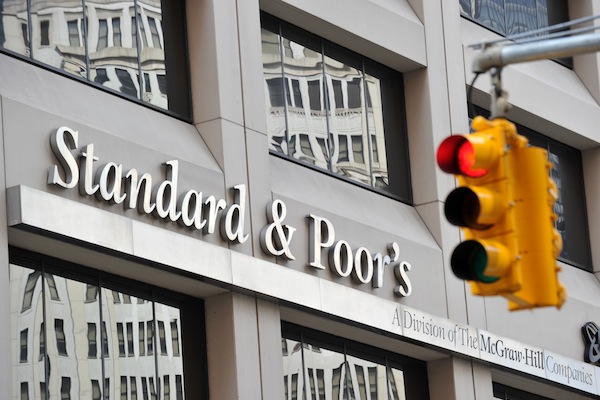Britain will lose its AAA rating within 18 months because George Osborne ‘no longer has credible plans to put the debt/GDP ratio on a stable or declining path’ according to Citi. Its verdict is worth reading in full (pdf) and is important because it adds weight to the idea that — as a result of Osborne’s lack of progress on the deficit — 2013 will be the year of the British downgrade.
What did it for Michael Saunders, the Citi analyst, was seeing Osborne take what James Forsyth refers to in this week’s political column as the St Augustine approach to deficit reduction: ‘Lord, let me balance the books but not yet.’ This eats away at Osborne’s credibility. Saunders says that, now,
‘The UK no longer has credible plans to put the debt/GDP ratio on a stable or declining path in our view, given that roughly half of the planned fiscal tightening is scheduled beyond the next election and beyond the end of the current detailed spending plans.’
He produces a graph that shows just how, with each statement that Osborne makes, his St Augustine complex kicks in harder – shoving more pain on to the post-2015 period.
Saunders continues:
‘It now seems likely that the mix of the rising debt ratio, weakened fiscal framework and uncertainties over the implementation of fiscal consolidation will lead to a one-notch downgrade of the UK by at least one major agency in the next 12-18 months.’
Osborne has already downgraded his golden rule:
‘It appears that the “debt target” has become merely an aspiration — for the debt/GDP ratio to fall in one year (2015/16) if the economy surprises on the upside — rather than a genuine target that will constrain policy’
And there was nothing this week to help growth:
‘the emphasis is mainly on trying to adjust the public finances to the weaker prospects for the economy rather than seeking to change the outlook.’
This is the sense of defeatism that I refer to in my Telegraph column today. If Estonia can buck the trend with different policies, so can Britain. Saunders also points to helping the low-paid: ‘renewed labour market deregulation (especially for younger workers)’.
And do downgrades matter? America’s downgrade was famously followed by a reduction in its gilt yields. But Saunders says it would hit Britain. As Andrew Lilco argued on ConHome, Osborne has explicitly asked us to judge him on the AAA rating so when it goes, it makes a Labour government more likely. And if that isn’t a risk to Britain’s economy, nothing is. Saunders puts it more delicately:
‘A downgrade in the UK probably would heighten political risks… [It] would be a major blow for the government and hence, by adding to risks that the coalition parties do badly in the 2015 election, it would increase uncertainty over the implementation of fiscal austerity in the runup to the 2015 election and beyond it — and such uncertainties probably would be bad for sterling assets in our view.’
So what’s next? Saunders expects that S&P will put Britain on ‘negative outlook’ in the next few months and then one agency will strip us of the AAA by the summer after next. Unless, of course, ‘the Chancellor announces a new and credible medium-term fiscal framework that gains broad political support.’ I.e., that he acquires a coherent growth strategy.
PS CoffeeHousers may want to know what I think Saunders’ opinion worth citing. He not only called the election right, but was the first to grasp that Osborne was going to have to tear up his debt target. Do click on the PDF link: it’s the best economic briefing you’ll read all week.








Comments